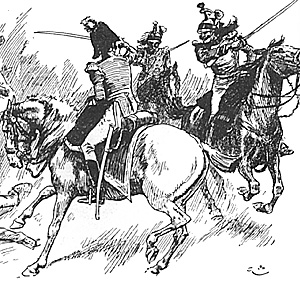 I would like to pass a few comments (rather than criticism) on Bob O'Brien's article in the March issue, which you may be pleased to reproduce on your letters page.
I would like to pass a few comments (rather than criticism) on Bob O'Brien's article in the March issue, which you may be pleased to reproduce on your letters page.
First, I feel, I should declare any interest that I may have on the subject. I certainly am interested in the Napoleonic Wars enough to have a small number of figures of the period But it is not my "main" period and I consider myself to have none (or at least not much!) of the passion he supposes the period to arouse in its "ardent followers".
The Napoleonic Wars are no more and no less special than any other war - they are all unique. However, since in warfare there are no new tactics - tanks may be used in a similar way to cataphracts, or hussers, depending whether they are heavy or light; Napoleonic columns manoeuvre in a similar way to the Swiss 15th century columns, or the Roman legionaries (particularly the Maniples of the early period - Bob will no doubt correct me!). I think this may be more clearly seen by comparing the development of naval tactics - first oared vessels rammed each other; then sailed vessels fired broadsides at each other, and later propeller driven ships also fired broadsides, launched aircraft, or today, missiles at each other. But tactics are still basically to concentrate more, stronger vessels against fewer, weaker vessels, (in an advantageous position if possible - crossing the "T" etc).
What made the Napoleonic Wars, and all other wars, unique, was not the "different tactics" but new combinations of old ones as dictated by the weapons and characteristics of the soldier. The weapons of the Napoleonic period were no different from those of the Seven Years War - but the attitude of the generals to the soldiers was different as was the attitude of the soldiers themselves. Bob's comments, while valid, also apply to all other periods.
I would agree with his comments in the latter half of his article. How often have we seen the Polish Lancers, or the Soots Greys charging gallantly at all and sundry in a table-top attempt to gain the glory that was theirs on the field of battle? Let us see some lesser known units in action! But this comment may also be applied to other periods - after all as Bob says the Napoleonic is not a special period.
Finally, let us see an end to the range stick and range estimation, which are not realistic. It is no business of the commanding general to direct or control the fire of batteries - that is the job of battery officers and NCOs. The skill, or lack of it, of the individual player in these directions should not affect the course of the battle - bad players should not win just because their guns do not miss! (and I say this as an engineer whose business involves estimation of distances!) Bob's suggested alternative sounds good and workable but more complicated rules are required for this, if replacing range stick and estimation methods - there is always a disadvantage.
Back to Table of Contents -- Wargamer's Newsletter #146
To Wargamer's Newsletter List of Issues
To MagWeb Master Magazine List
© Copyright 1974 by Donald Featherstone.
This article appears in MagWeb (Magazine Web) on the Internet World Wide Web.
Other military history articles and gaming articles are available at http://www.magweb.com